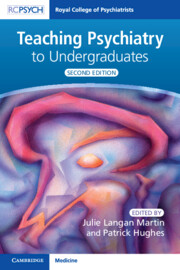Book contents
- Teaching Psychiatry to Undergraduates
- Teaching Psychiatry to Undergraduates
- Copyright page
- Contents
- Contributors
- Section 1 Principles of Medical Education
- Section 2 The Undergraduate Psychiatry Curriculum: Planning and Delivery
- Chapter 2.1 Understanding Curriculum Design
- Chapter 2.2 Preclinical Versus Clinical Years
- Chapter 2.3 Patients as Educators in Psychiatry: The Ethical and Educational Case
- Chapter 2.4 Assessment of Undergraduates in Psychiatry
- Chapter 2.5 Beyond the Undergraduate Core Curriculum
- Chapter 2.6 Supporting the Psychiatrists of Tomorrow
- Section 3 Clinical Placements in Psychiatry
- Section 4 Formal Teaching
- Section 5 Materials Development
- Section 6 Gathering feedback and quality improvement
- Section 7 Student Welfare
- Section 8 Developing as a medical educator
- Index
- References
Chapter 2.3 - Patients as Educators in Psychiatry: The Ethical and Educational Case
from Section 2 - The Undergraduate Psychiatry Curriculum: Planning and Delivery
Published online by Cambridge University Press: 12 October 2022
- Teaching Psychiatry to Undergraduates
- Teaching Psychiatry to Undergraduates
- Copyright page
- Contents
- Contributors
- Section 1 Principles of Medical Education
- Section 2 The Undergraduate Psychiatry Curriculum: Planning and Delivery
- Chapter 2.1 Understanding Curriculum Design
- Chapter 2.2 Preclinical Versus Clinical Years
- Chapter 2.3 Patients as Educators in Psychiatry: The Ethical and Educational Case
- Chapter 2.4 Assessment of Undergraduates in Psychiatry
- Chapter 2.5 Beyond the Undergraduate Core Curriculum
- Chapter 2.6 Supporting the Psychiatrists of Tomorrow
- Section 3 Clinical Placements in Psychiatry
- Section 4 Formal Teaching
- Section 5 Materials Development
- Section 6 Gathering feedback and quality improvement
- Section 7 Student Welfare
- Section 8 Developing as a medical educator
- Index
- References
Summary
This chapter considers why it is important to involve patients (and their carers) in medical student teaching and training. The educational case for their involvement is considered, along with some of the policy and ethical considerations. The Derby “Expert Patient” project is described as an example of how to set up a sustainable educational programme with patient involvement.
- Type
- Chapter
- Information
- Teaching Psychiatry to Undergraduates , pp. 35 - 41Publisher: Cambridge University PressPrint publication year: 2022



